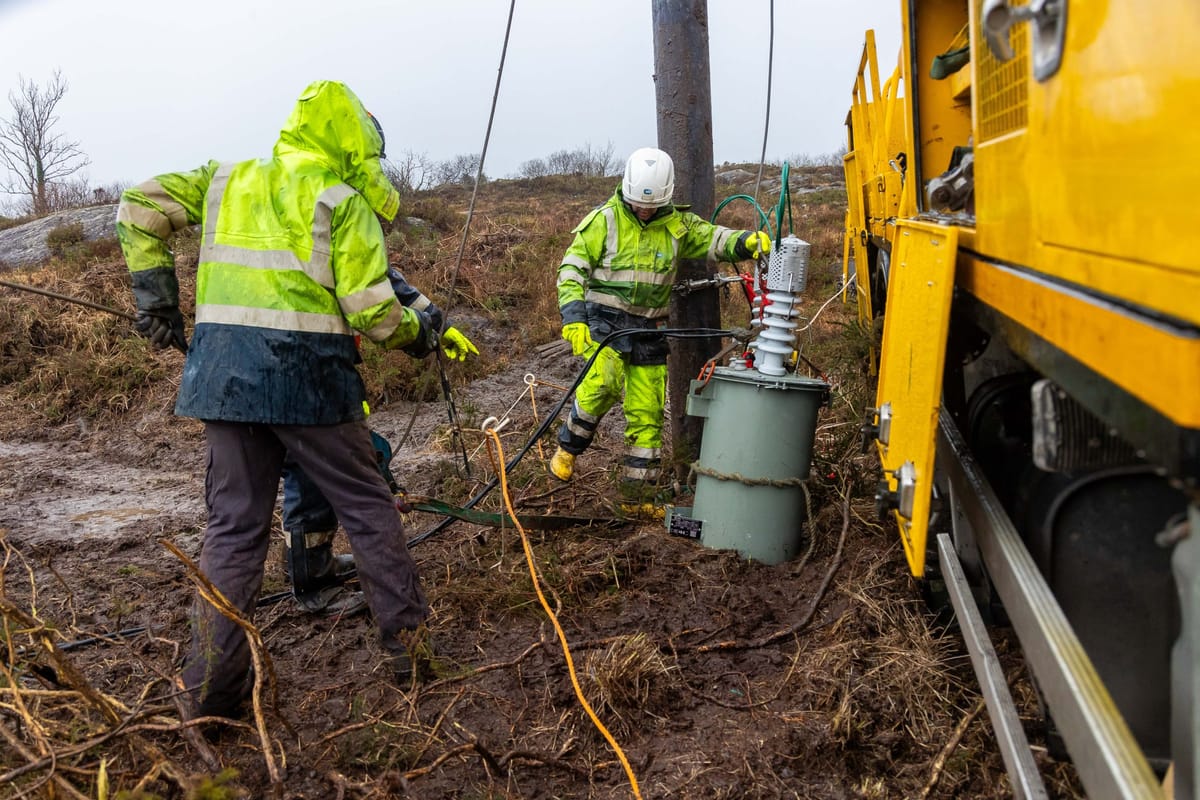NECG Continues Recovery Efforts Following Storm Éowyn
Recovery efforts continue after Storm Éowyn, with power, water, and telecom services being restored.

The National Emergency Coordination Group (NECG) convened again today to oversee ongoing recovery operations following the impact of Storm Éowyn. Efforts are being coordinated to restore power, water, telecommunications, and essential services to affected areas, with significant progress already made.
Power Restoration Efforts
ESB Networks has restored power to 723,000 homes, farms, schools, and businesses. However, approximately 45,000 customers remain without electricity. All available resources, including skilled technicians from Austria, Finland, France, Germany, the Netherlands, Norway, and the UK, are assisting ESB Networks in repairing extensive damage to the power infrastructure.
Customers are advised that temporary short outages may occur as work continues to reconnect neighbouring properties. Updates on power restoration can be found at PowerCheck.ie.
For safety, ESB Networks has urged the public to stay clear of fallen electricity wires, as they are live and extremely dangerous. Any damage to the electricity infrastructure should be reported to ESB Networks at 1800 372 999.
Water Supply Restoration
Less than 400 premises remain without water, as Uisce Éireann continues working to restore full supply. Large-capacity generators provided by Poland and Denmark are being used to power water treatment plants, pumping stations, and reservoirs. Alternative water supplies have been made available in affected areas, with updates accessible at water.ie or via Uisce Éireann’s helpline at 1800 278 278.
Telecommunications Recovery
Storm Éowyn caused the most extensive telecom disruption ever recorded by the Commission for Communications Regulation (ComReg). As of today, 1.25% of fixed-line users remain without service, while 3.5% of mobile users are experiencing connectivity issues, particularly in the north and west of the country. Restoration efforts prioritise voice and SMS services, with data services expected to return gradually.
International Assistance and EU Civil Protection Mechanism
Ireland has received emergency support through the EU Civil Protection Mechanism, including:
- 10 x 27.5 kVA generators from Poland
- 3 x 512 kVA generators from Poland
- 1 x 100 kVA generator from Denmark
- 3 x 150 kVA generators from Denmark
These generators are being deployed to support water and telecommunications infrastructure.
Local Emergency Response and Humanitarian Assistance
Local Coordination Groups are active in 16 local authority areas, ensuring vulnerable individuals receive necessary support. Emergency Response Hubs, which initially stood at 380, have now been reduced to 327 operational hubs, offering basic needs such as water, hot meals, phone charging, broadband access, and shower facilities.
In addition, the Irish Red Cross has launched "Happy Hubs" in Leitrim and Monaghan, providing a supportive space for exam-year students and young people affected by power outages. These hubs will offer well-being sessions, study spaces, and refreshments.
The Humanitarian Assistance Scheme remains open to affected homeowners, providing financial support for essential needs and alternative accommodation where necessary. Further details are available at gov.ie.
Public Safety Warnings
Authorities have issued critical safety reminders regarding electricity, generators, and carbon monoxide risks:
- Avoid fallen power lines, which are live and extremely dangerous.
- Never connect generators directly to a home’s power system, as this poses severe risks to ESB repair crews.
- Use generators outdoors, at least 7 metres away from buildings.
- Install and test carbon monoxide (CO) alarms regularly.
For more safety advice, visit carbonmonoxide.ie.
Schools and CAO Deadlines
Most schools affected by power outages have now reopened. The Department of Education is working with ESB Networks to provide temporary generators for the remaining schools still without power.
Additionally, an exceptional application facility has been introduced for students impacted by Storm Éowyn, allowing them to submit their CAO forms via cao.ie until 6 February at 5pm.
Scam Warnings
The National Cyber Security Centre (NCSC) has detected fraudulent text messages impersonating ESB Networks. Members of the public are advised not to engage with these messages or provide personal information. If you receive a suspicious message, report it to An Garda Síochána.
Healthcare and Medical Devices
For individuals reliant on electrically powered medical devices, the HSE recommends:
- Checking reconnection updates at 1800 372 757 or PowerCheck.ie.
- Seeking alternative locations to charge devices, such as community hubs.
- Contacting a GP or emergency services if needed.
Farm and Forestry Safety
Farmers are urged not to take unnecessary risks when repairing storm damage. Any fallen or damaged power lines must be reported immediately to ESB Networks.
In response to widespread forestry damage, Ministers Heydon and Healy-Rae have established a Taskforce to coordinate safe clean-up operations. The Department of Agriculture and Coillte are currently assessing storm damage via satellite imagery.
Ongoing Efforts and Next Steps
The NECG will reconvene tomorrow to continue monitoring recovery efforts. Updates will be provided via gov.ie/stormresponse.
Public Helplines:
- Power outages: 1800 372 999 (ESB Networks)
- Water supply: 1800 278 278 (Uisce Éireann)
- Emergency services: 999 or 112
- Government assistance: www.gov.ie/stormresponse
